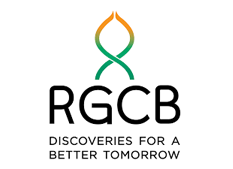Date of Inception
RGCB started as a small charitable society called the Centre for Development of Education, Science and Technology (C-DEST) in 1990. The C-DEST was made a "Grant-in-Aid" institute of the Government of Kerala in 1991 and renamed as Rajiv Gandhi Centre for Development of Education, Science and Technology (RGC-DEST). On April 1, 2007, DBT took over the institute as its Autonomous Institution.
Mandate
The mandate of the institute is, i) Fundamental Research: Understanding the biology that defines basic mechanisms involved in disease processes and their implications for human health, ii) Translational Science: Trans-disciplinary health science to benefit individual, clinical, and public health decision making to improve health, iii) Technology Development: Turning research into technology innovation and on to business, iv) Training and Education.
Campus
RGCB currently operates through three campuses. The main campus is located at Jagathy in Thiruvananthapuram, where the bulk of discovery research programs are implemented with a land area of 3 acres. The second campus is about 20 acres and located at the KINFRA Park in Thiruvananthapuram functions as the transit facility for the Bio-Innovation Center where RGCB’s core Bio-Imaging, Genomics, and Laboratory Medicine & Molecular Diagnostic core facilities are located in addition to laboratories for Chemical Biology, and Tropical Disease Biology. The third campus, located in Kalamaserry, Kochi, is called the Bio-Nest, a setting for translational biotechnology.
Research Focus
The main research themes are i) Cancer research, ii) Cardiovascular disease& Diabetes biology, iii) Pathogen biology, iv) Regenerative biology, v) Neurobiology, vi) Reproduction biology, vii) Plant biotechnology, viii) Transdisciplinary biology.
Human Resource
The institute currently has 40 scientists and around 100 research fellows engaged in high-quality research, supported by 71 technical staff and 23 administrative staff.
Key Scientific Achievements
Major achievements for the last 5 years (2017-22) are as follows:
Publications
PhD Degrees Awarded
Postdocs and research fellows
Patents awarded
Technologies commercialized
- The HPV Vaccine Study: An increase in worldwide HPV vaccination could be facilitated if fewer than three doses of vaccine are as effective as three doses. RGCB successfully implemented a multi-center clinical trial comparing two doses versus three doses of the human papillomavirus vaccine. Results from the study have led to the recommendation of 2 doses separated by 6 months or more for routine vaccination of young girls (now accepted by WHO).
- The Curcumin Chemoprevention Trial: Oral cancer continues to be one of the most common malignancies in India. RGCB successfully conducted a clinical trial that established oral curcumin as an oral cancer chemopreventive agent. Combined clinical and histologic response assessment indicated a significantly better response with curcumin. The treatment did not raise any safety concerns. Treatment of oral leukoplakia with curcumin (3.6 g for six months) was well tolerated and demonstrated significant and durable clinical response.
- In a joint study with Emory University RGCB investigated antimicrobial peptides from the skin of the South Indian frog, Hyalaranamalabarica and demonstrated that a novel host defense frog peptide is virucidal for H1 hemagglutinin-bearing human influenza A viruses. It represents a novel class of anti-influenza virucide that targets hemagglutinin.
- Among the major re-emerging infections in the country, two arboviral infections assume prime importance- chikungunya and dengue. Studies at RGCB have revealed novel mutations and molecular signatures in Indian strains of chikungunya viruses and have shortlisted molecules that are differentially expressed upon infection.
- Spice Genomics - Transfer RNA Derived Small RNAs Targeting Defense Responsive Genes are shown to be induced following fungal infection in Black Pepper (Piper nigrum L.), which is the main component of the cash crops from Kerala, severely compromising crop yield. The evaluation of these candidate sRNAs in plant-pathogen interaction will lead to advanced disease-resistant strategies with wider application in the improvement of stress tolerance in plants.
- A dedicated life-time imaging facility is being established at the Akkulam campus to support training in lifetime imaging and the development of cell line resources of molecular sensors for lifetime imaging.
- The Laboratory Medicine and Molecular Diagnostics (LMMD) at RGCB is a NABL, ILAC, and NABH accredited diagnostic facility of DBT.
- Molecular Forensics & DNA Technologies (MFDT) provides DNA Fingerprinting and DNA Barcoding services to the public. Established in 2007 as the Regional Facility for DNA Fingerprinting (RFDF), MFDT now includes RFDF and a DNA Barcoding Lab. The major service of RFDF is to provide human DNA Fingerprinting services to judicial, crime investigating, and law enforcement agencies. Species identification in Wildlife Forensics is another service offered by RFDF, helping law enforcing agencies to punish the offenders to prevent illegal poaching by providing evidence. RFDF has been granted accreditation by the National Accreditation Board for Testing and Calibration Laboratories (NABL) per ISO/IEC 17025: 2017 standard in the field of Forensics.
- The faculty and students at RGCB have received numerous awards for their scientific contributions such as Swarnajayanti Fellowship, Ramalingaswami Fellowship, Ramanujan Fellowship, Prof. G. P. Talwar Gold Medal Award, Merck Young Scientist Award, EMBO travel award, Prof. P. Govindarajulu Oration and Gold Medal, DBT Innovative Young Biotechnologist Award and many best poster/presentation awards in national and international conferences. Several scientists are also members of national expert committees and elected fellows of prestigious academies and societies.
- The institute has organized outreach and public engagement events such as National Science Day celebrations, Science expos, participation in India International Science Festival, Science Setu lectures, Regional Children's Science Congress, interactions with students from schools and tribal colonies, etc.
